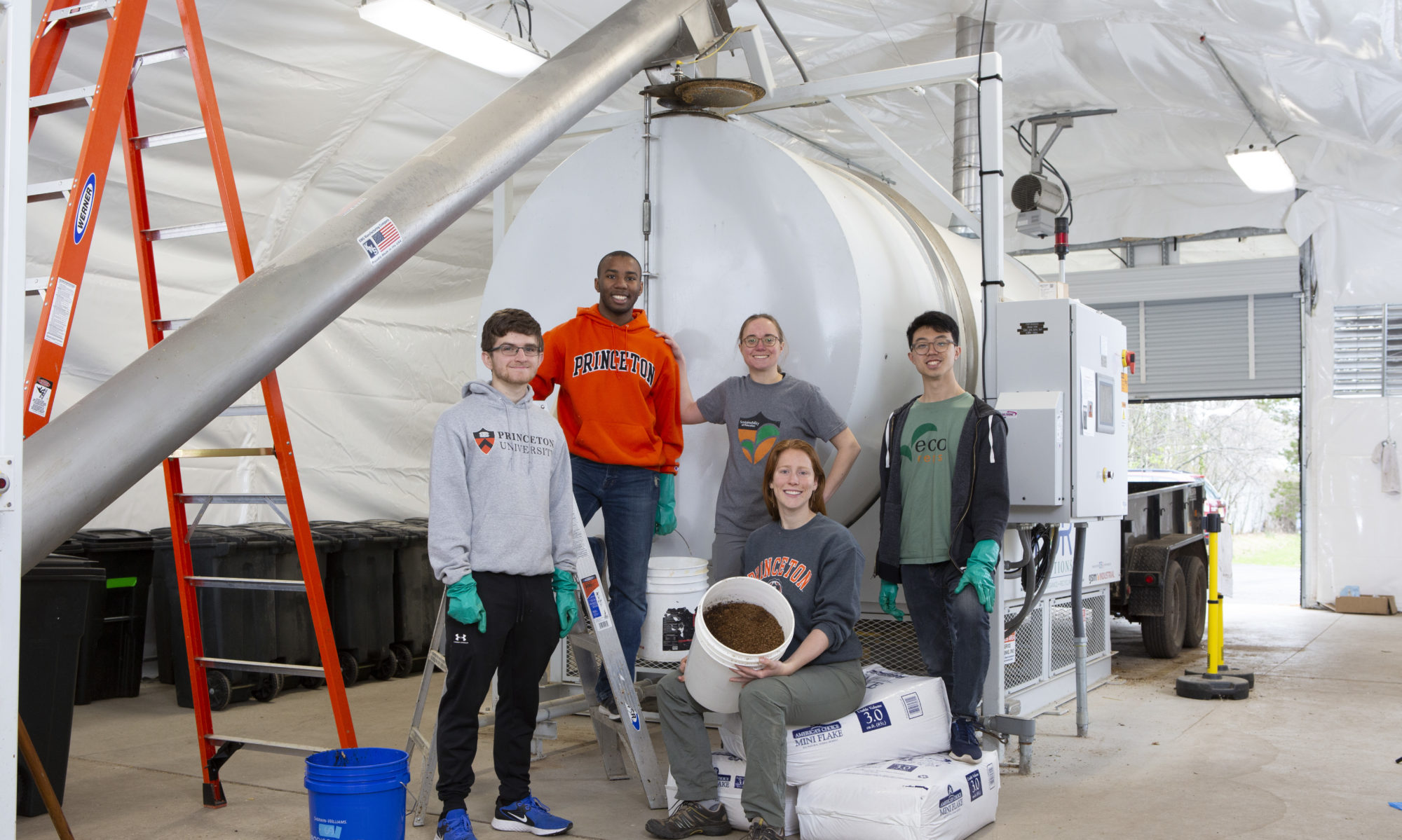In this week’s bioDIGESTer, we present the weekly statistics from the last three operational sessions, and highlight our team of student operational assistants! In their own words, learn more about why they consistently make the cross-campus trek to take part in this initiative.
Data: Similar to prior weeks, we continued to load ~3,500 lbs. of food scraps into the system and off-load an equal amount in finished compost over a week’s worth of operations.
|
Food |
Wood shavings (BA/CS) |
%
BA/CS |
Compost Off-loaded |
| Week Totals (lbs.) |
3,565 |
1,071 |
30% |
3,000 |
| CUMULATIVE (lbs.) |
21,075 |
6,133 |
29% |
12,500 |
Meet the Team!


Name: Daniel Tjondro ’20
Major: Civil & Environmental Engineering
Hometown: Queens, NY
Why I was interested in assisting: To reduce food waste on campus by repurposing it into nutrient-rich soil.

Name: Ezra Zinberg ’21
Major: Computer Science
Hometown: Teaneck, NJ
Why I was interested in assisting: I want to do what I can to reduce waste and make Princeton a place that lives up to our highest environmental ideals
Name: Frederick Hagen-Gates ’22
Major: Mechanical & Aerospace Engineering
Hometown: Woodbridge, VA
Why I was interested in assisting: I needed a campus job and this seemed like a good idea.
Name: Gregory Smith ‘21
Major: Computer Science
Hometown: Philadelphia, PA
Why I was interested in assisting: I am fully supportive of Princeton’s extensive sustainability efforts and want to do my part. Additionally, working with the biodigester team has helped me to stay conscious of the sheer amount of food we collectively waste, motivating me to make environmentally conscious decisions at all times.

Name : Helena Van Brande ’19
Major: Comparative Literature
Hometown: Thousand Oaks, CA
Why I was interested in assisting: First, as someone interested in farming, composting has always intrigued me. More pressing, however, is that food waste is a terrible part of the food environment on the Princeton campus and also in the food industry at large. One way to ameliorate it is through compost, so that it can be used other than for human consumption, and the biodigester does this much faster than traditional composting. I am looking forward to learning more and being a part of the team!

Name : Henry Wietfeldt ’22
Major: Physics (prospective)
Hometown: New Orleans, LA
Why I was interested in assisting: To help the environment!

Name : Herman Ishengoma ’22
Major: Computer Science
Hometown: Dar es Salaam, Tanzania
Why I was interested in assisting: The position allowed me to get some hands-on experience with recording and studying data in the field. All whilst at the same time making a positive impact to our planet.

Name : Isabel Koran ’22
Major: Mechanical & Aerospace Engineering (prospective)
Hometown: Norton, MA
Why I was interested in assisting: I want to be a part of a team that is tackling major sustainability challenges at a tangible, local level. I’m excited to have the opportunity to use Princeton’s campus as a laboratory to answer the question that has helped shape my choices for the past several years: What can I do to help develop more sustainable methods of meeting human needs and lessen environmental impact?

Name : Joe Kawalec ’21
Major: Ecology & Evolutionary Biology (prospective)
Hometown: East Brunswick, NJ
Why I was interested in assisting: I wanted to get some hands on experience with data collection and composting, as well as get involved with a great sustainable initiative on our campus.

Name : Kaylin Xu ’22
Major: Undecided
Hometown: Vancouver, Canada
Why I was interested in assisting: I care about sustainability and I also work in the dining hall, so I am just following the compost trail to the biodigester.

Name : Vincent Yang ’22
Major: Electrical Engineering or Computer Science
Hometown: Philadelphia, PA
Why I was interested in assisting: I wanted to work a job that had a meaningful impact on the world. In the biodigester operational assistant job, I found an opportunity to work for the benefit of the community, helping to convert Princeton University’s food waste to compost. I also felt that because the biodigester project was a brand-new job opportunity, it would feel like working at a start-up where all my colleagues would be enthusiastic about the work and everyone would be open to new ideas that help to improve the project.

Name : Wesley Wiggins ’21
Major: Geoscience (prospective)
Hometown: Washington, DC
Why I was interested in assisting: To further participate in helping the campus become greener and environmentally-friendly. I also want to learn more about sustainable practices and meet new people

Name : Zoe Rennie ’21
Major: Ecology & Evolutionary Biology
Hometown: San Leandro, CA
Why I was interested in assisting: Interested in substituting potentially harmful synthetic materials with cleaner and organic alternatives


























